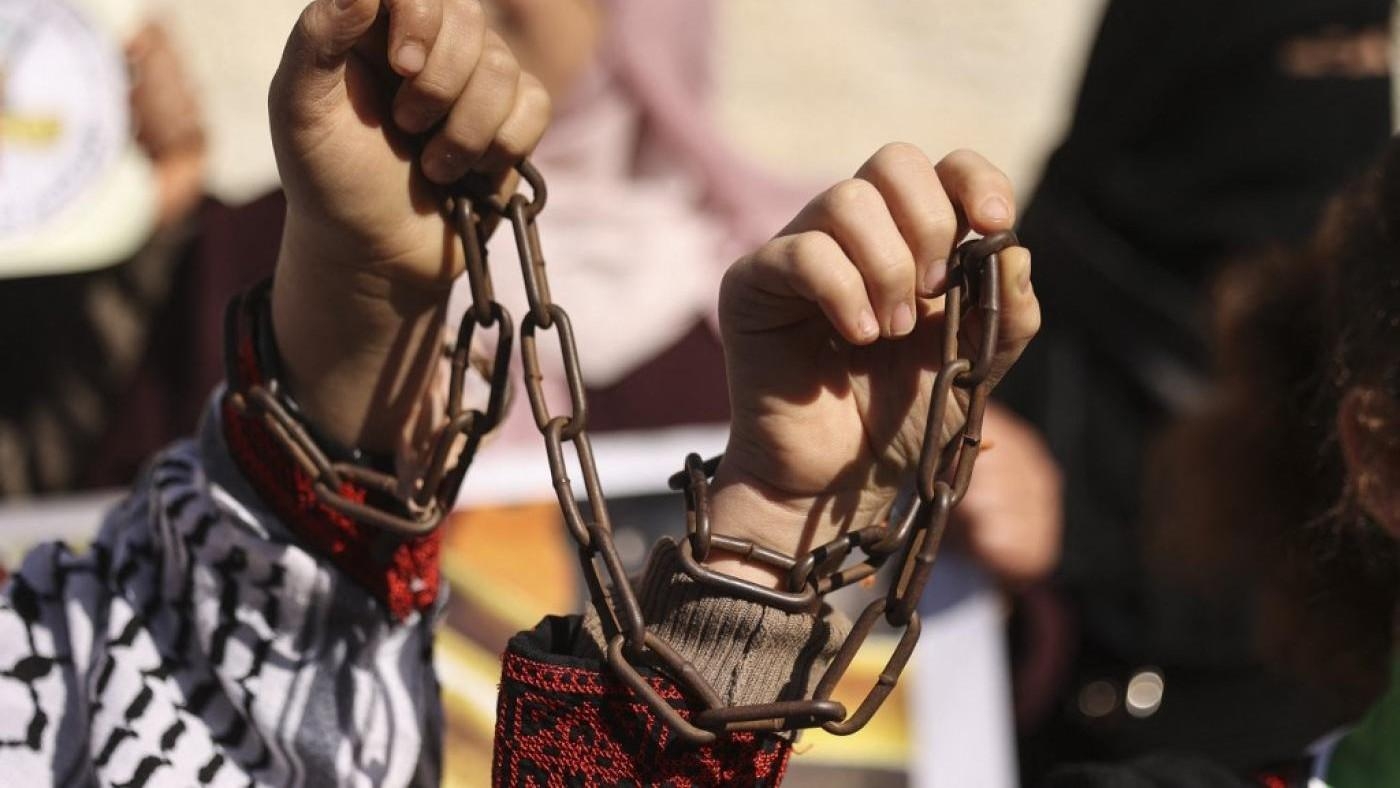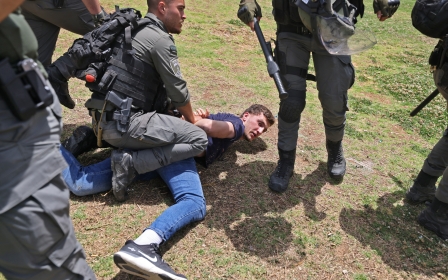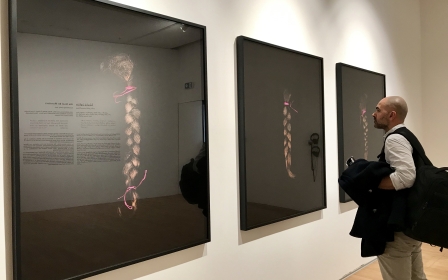How Israel's Supreme Court enables torture of Palestinian prisoners

Before the current far-right government's war on the judiciary, there was a little covered news story out of the Israeli Supreme Court.
On 29 December 2022, the high court once again capitulated to the demands of the state regarding the issue of prison conditions and the size of prison cells in particular. It granted the state's request and extended, for the third time, the deadline for expanding the living space of detainees until 31 December 2027.
In most Western countries, the size of standard prison cells ranges between six and 12 sqm, while in Israel, it is less than three sqm
In response to a petition by Israeli human rights organisations including the Association for Civil Rights (ACRI), the Supreme Court issued an order in June 2017 to expand the living space of prisoners to 4.5 sqm - giving the Israel Prison Service an initial deadline of nine months (HCJ 1892/14 ACRI v Public Security Minister).
In most Western countries, the size of standard prison cells ranges between six and 12 sqm, while in Israel, it is less than three sqm.
The ruling seemed to acknowledge the cruel, humiliating, and inhuman living conditions of the prisoners. In the opening statement of the decision, Judge Yitzhak Amit wrote that "society is evaluated…through its treatment of prisoners". He pointed out that "depriving them of their freedom through imprisonment does not mean depriving them of their right to dignity, which stems from the prisoner's right to determine the minimum living space".
However, despite this statement, the court approved maintaining these conditions for an additional five years which then became 10 years from the initial judgement.
'Unfit for human beings'
In 2014, ACRI, Physicians for Human Rights (PHR-I), and other groups petitioned the Supreme Court to address overcrowding in Israeli jails and prisons and compel the state to immediately increase the living area of prisoners to a minimum 4.5 sqm as a temporary solution until it is raised even further as part of a long-term plan.
The petition stated that prisoners are forced to spend hours of their day in bed, without the ability to move or stand, and those sharing a cell are unable to stand or walk at the same time in the limited space.
As a result, prisoners are often forced to carry out their entire daily routine in bed, including eating. It further argues that overcrowding creates suffocation in the cells, harms the health of the prisoners, and causes increased friction between them.
It is far from the acceptable size in countries considered democratic (8.8 sqm) and from the minimum adopted by international institutions to ensure reasonable adequate living conditions that are mentioned in a 2012 report published by the International Committee of the Red Cross.
Unfortunately, the situation in Israeli prisons has been the same for decades, but the state has done nothing to offer solutions or make changes. In its 2019-2020 annual report, Israel's Public Defence warned of prison overcrowding and prisoner rights violations. The report described the existing prison conditions as a "serious violation of human dignity". It criticised the narrow size of the prison cell at 2.5 sqm, asserting that it is "too small for even one resident".
The report reiterated earlier calls to immediately stop holding prisoners in these cells, maintaining that they are "unfit for human beings". It further noted that a prison cell area today is less than half of the minimum approved by Israel Prison Service, the main carceral authority which specified 6 sqm as a reasonable amount of space.
The Public Defence report further held that this matter not only affects the rights of detainees, but also violates the state's obligation to refrain from cruel, inhumane, and degrading punishment, a basic standard of international law.
Failure to comply
On 13 June 2017, the Supreme Court ordered the state to increase the minimum prison living area. To ease the implementation of these reforms, the high court divided the process into two stages: the first would grant the state nine months to increase the living area for prisoners to 3 sq m (not including a toilet and shower). An additional nine months from the court order to increase the living area further to 4.5 sqm would comprise the second stage.
However, on 5 March 2018, a week before the deadline for stage one reforms expired, the state submitted a request to the court to postpone the implementation for 10 years from the initial ruling to 2027. The state argued that compliance with the timeline established by the court would require a "mass release" of prisoners and "endanger" the public.
The petitioners rejected these claims, arguing that the state took no action to construct new detention centres, and restating the high court's observation about the inadequate facilities, many of which were built during the British Mandate. It also opposed the suggestion of a public safety issue, calling these "idle threats intended to intimidate the court".
The court sharply criticised the state's actions and initially rejected the state's request. This compelled the state to submit a plan to construct new wings for hundreds of security prisoners and an increase of administrative release that will result in the evacuation of about 1000 places of confinement.
In June 2018, the state updated the court on its intent to use Saharonim Prison in the Negev desert as an immigration detention centre as part of the first stage of reform.
As for the second stage of the ruling - guaranteeing a minimum living space of 4.5 sqm for each prisoner by December 2018 - the state failed to make any progress on this matter, leading human rights groups to demand that the court force it to adhere to the letter of its judgement.
A torture loophole
In a notice issued on 29 July 2018, the state informed the court of its plan to establish by the year 2026 new centres for housing prisoners interrogated by Shin Bet, Israel's security service. It also announced its intent to petition the high court to amend its judgement in order to exempt Shin Bet facilities from expanding the living space for prisoners until 2027. Currently, the Shin Bet cell size is 2 sqm or less.
The petitioners representing various human rights groups opposed the state's request, arguing that this population should actually receive priority in the efforts to adapt prison conditions to the court's ruling and that postponing the execution date of the ruling by at least eight years is unreasonable.
The Public Defence annual report ordered the Israel Prison Service to immediately stop holding prisoners in the small cells, maintaining that they are 'unfit for human beings'
The state then argued that expanding prisoner living space would harm Shin Bet’s ability to obtain information and would strongly affect the number of investigations launched at a time.
Ironically, its justification was based on full recognition that the detainees' living space, below the minimum area, clearly constitutes a tool of torture and pressure to "obtain information" or confessions from Palestinian detainees
Most of the so-called security investigations target Palestinians, subjecting them to conditions that violate the Convention against Torture to which Israel is a signatory.
In 2022, an Israeli parliament committee twice unanimously approved a draft law to amend the penal code (Powers of Arrest, Living Space in the Shin Bet Detention Centres), which also exempts Shin Bet detention centres from expanding the living space of prisoners as ordered by the Supreme Court.
To make matters worse, the draft law suggests implementing secret standards by an official and the Shin Bet director. Human rights organisations expressed concerns that these "standards" would fail to protect the rights of prisoners who would be subjected to conditions of torture in violation of international law.
As stated in the draft law explanation, the determination of standards and laws for the living space of security detainees is carried out by the prime minister, with the approval of the minister of justice and the ministerial committee of the Shin Bet, as well as the approval of a joint special committee of the Foreign Affairs, Defence Committee and the Law Committee in the Knesset.
This proposal was met with strong opposition by human rights organisations, and a number of them - the Committee Against Torture, the Centre for the Defence of the Individual (HaMoked), and Physicians for Human Rights - submitted on 8 February 2020 their observations on the proposed draft law to the acting judicial advisor. They affirmed that it attempts to circumvent the court’s decision and that the proposal continues to unreasonably infringe upon detainees' rights and discriminate against these detainees, in particular.
They also noted that any law must be subject to legal standards and noted that it contravenes what was approved in the Israeli Basic Law: Human Dignity and Freedom.
They stressed that these special Shin Bet headquarters should receive more attention with regard to ensuring living space, as they are hidden from the public eye and even from official supervision in most cases. Moreover, the detainees in these facilities are usually prohibited from meeting lawyers.
The state's request to delay implementing the new space requirements sent the court into a spiral. While it has the power to extend deadlines, it can only do so on rare occasions.
As stated in the court decision, "extending deadlines, in turn, could lead to a situation in which the existing illegal situation continues to harm the parties' expectations of relying on the court, and harm putting an end to the arbitration. Also, extensions in unnecessary cases will lead to harming the principle of the rule of law."
This decision means that detainees and prisoners in Israeli prisons will continue to live in harsh, inhumane conditions for an additional five years.
These conditions, according to the public defence report, "are considered a severe abuse of the detainee rights, their dignity, their health, and their privacy, which is exacerbated by the harsh living conditions".
The worrisome matter is that these harsh conditions when added to the inhumane treatment amount to torture, especially in the Shin Bet detention centres - exempt from the court order - where severe cold, deafening noise, sleep deprivation, restrictions on movement, prevention from going out to the yard, bad food, a lack of beds and blankets, poor hygiene, and other torturous conditions prevail.
The views expressed in this article belong to the author and do not necessarily reflect the editorial policy of Middle East Eye.
This article is available in French on Middle East Eye French edition.
Middle East Eye propose une couverture et une analyse indépendantes et incomparables du Moyen-Orient, de l’Afrique du Nord et d’autres régions du monde. Pour en savoir plus sur la reprise de ce contenu et les frais qui s’appliquent, veuillez remplir ce formulaire [en anglais]. Pour en savoir plus sur MEE, cliquez ici [en anglais].






